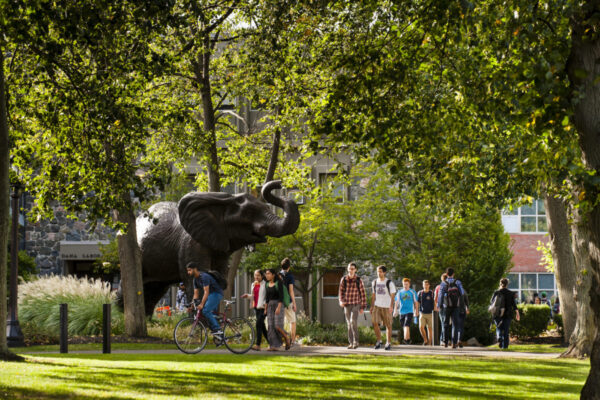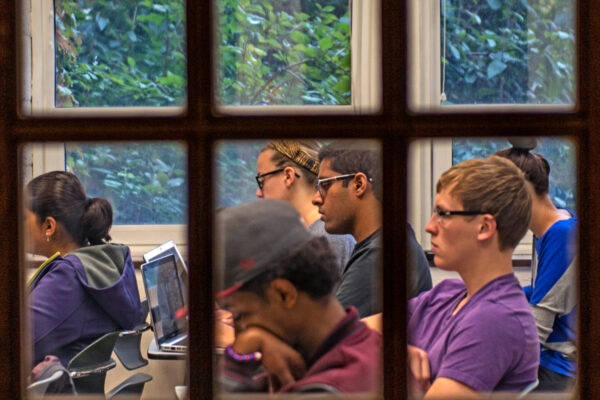By Catherine Haras
The need for continual learning is a given in most professions. Architects, doctors, engineers, and teachers are expected to keep up with current practice, for their careers as well as for their clients, patients, and students.
By contrast, professional development (PD) within higher education is confounding. Most literature on professional development is housed in teaching journals (followed by health, business, social sciences, and the sciences), yet curiously, academic professional development is regarded as supplementary. Faculty tend to equate continuing learning with research in the discipline, not teaching.
For most college instructors, regular participation in their teaching development is neither a workplace expectation nor a professional obligation. And while faculty welcome learning opportunities, we do not always agree on what PD is or how it should be offered. Many PD practices—regardless of profession—focus on delivering information rather than creating conditions for learning that professionals would find relevant or useful. For example, training programs are arguably ineffective if they do not result in changes to professional practice.
Thinking about the kinds of PD that contribute to career growth raises the question: How do professionals continue to learn? Incredibly, this topic is not yet well understood. Despite decades of theory and research on cognition and adult learning, there is still a need to understand how professionals, in this case faculty, keep learning—changing—throughout their careers.
The case has recently been made that faculty who regularly participate in professional development improve their students’ chances for success. The Tracer Project, a joint study between Carleton College and Washington State University, found that faculty development is an effective professional practice.
But how does teaching practice change over the arc of one’s professional life? Are faculty changed by their teaching? How? And how is teaching identity constructed over the course of a career, in the workplace, or in relation to multiple workplaces—the lived reality of contingent faculty, now the majority of college instructors teaching in the United States?
Faculty are by definition experts. All experts construct and assimilate new information within the context of existing practice. Experts, unlike novices, are also autonomous in their learning. Meanwhile, traditional PD literature has tended to focus on faculty as in some ways remedial, in need of improvement, rather than as experts engaged in self-directed learning. It has been argued that much professional development is training in disguise. College faculty sense and resist such deficit philosophical assumptions about their own learning, and, by extension their qualifications and abilities.
The way that PD is conceptualized in both research and practice has been the subject of criticism over the past decades. Literature had tended to separate professionals from the learning context. However, meaningful faculty professional development occurs in situ: in the classroom, on campus(es), and with professional affiliations and organizations. These environments together influence and help faculty construct personal meaning and identity and cannot be separated from practice. Most faculty learn to teach outside of PD opportunities, informally, from colleagues and mentors. Faculty development should respect these contexts and factor them into programming.
A lot of PD can mirror teaching, devoted to content, not practice—to what is taught, and not how it is taught. PD often relies on the workshop model, demonstrated to be ineffective. The implication is that knowledge about teaching and learning can be acquired through transfer and is primarily cognitive.
One researcher calls the PD process “topping off,” as if all faculty come ready to teach and are in need of only occasional refreshment rather than continuous practice associated with mastery in any field. This version of educational development is divorced from what we know about experts as constructivists, and from the active role that skills and attitudes play in shaping teaching. It turns out that the lived experience of the faculty truly matters. Skills and attitudes about teaching matter. Good professional learning captures these dynamics.
It may be helpful to think about embedding faculty development within what Ann Webster-Wright calls “authentic professional learning.” Practice here refers to repeated exercise and actual application. It is authentic in that faculty put into practice what they are learning in the place where they exercise their expertise: in the classroom, clinic, studio, or lab.
Scaffolded faculty development is one way to achieve such authentic professional practice. Scaffolded PD is ongoing and features regular practice and demonstration in the workplace. It may constitute sub-practices, including long programming, building communities or cohorts of faculty, and coaching and informal peer observation of teaching practice. Scaffolding PD acknowledges that professional learning about teaching is a process, a commitment, and a way of thinking that takes time, thought, and work.
The following are some current examples of scaffolded faculty development:
Stanford Faculty Development Center for Medical Teachers’ Clinical Teaching Program. This 1-month training provides participants with seminar leadership skills required to deliver a series of seven, two-hour seminars to colleagues and residents, while practicing their teaching.
Berkeley Center for Teaching and Learning Transforming STEM Teaching Faculty Learning Program, a blended professional learning program. Instructors first participate in a series of synchronous, interactive online workshops offered every two weeks, as well as reflective discussions. Synchronous sessions guide faculty through the process of redefining their role as instructor in their college courses, as they develop deeper understanding of how learning happens and how to support learning. Members participate in peer observations to provide/ receive feedback on their teaching.
Faculty Learning Communities (FLCs) or mentoring networks where faculty informally observe each other in the classroom and practice their teaching together. The University of Georgia Center for Teaching and Learning UGA Fellows for Innovative Teaching FLC themes FLC programming to align with a university initiative (e.g., SCALE-UP in 2016, challenging gateway courses in 2017). For the 2017 cohort, UGA required each FLC fellow to receive two classroom observations over the semester, one performed by a peer fellow and one by a CTL assistant director.
Certificates in college teaching for graduate students/TAs that also require a teaching visit, peer observation and feedback, such as Duke University’s Certificate in College Teaching. Duke employs “teaching triangles” where instructors observe other instructors and must also be observed.
Emerging andragogic models where faculty follow a repeating pattern of observation, critique, practice and reflection. At California State University, Los Angeles, our Center for Effective Teaching and Learning convenes a community of 25 faculty each semester who observe/critique via ACUE online modules, eventually record themselves in the classroom, debrief, and continuously reflect/act on the process with peer mentors. CETL staff continue to follow up with participants through community gatherings and informal consultations.
The Academy of Inquiry-Based Learning (AIBL), a community of college math instructors, math teachers, and supporters of inquiry-based learning (IBL), broadly defined. AIBL supports instructors interested in teaching IBL courses.
Most of the scaffolded PD programs referenced above share the following dynamics:
- They are constructivist, experiential, and avoid lecturing.
- They are programmatic and longitudinal, absorbing the workshop model into a series of rich, related experiences.
- They are iterative and set an expectation of practice for participants.
- They track with faculty and, critically, follow up after programming has finished, checking in as needed.
- They create communities of faculty who can coach and mentor one another.
- They center faculty development in the workplace, where faculty are, and where they struggle.
- They ask faculty to routinely reflect, a metacognitive practice that allows for deepening self-awareness and goal-setting, preconditions for improved practice.
- They are personally meaningful and responsive to faculty need.
- They require teaching and learning centers to provide a safe space along with thoughtfully sequenced programming. Faculty developers serve as facilitators only, and provide neutral space to take small risks and make changes.
Scaffolded professional development provides a supportive learning environment that grows an appreciation for the subtle art of teaching well. Faculty developers can construct profound professional learning experiences with and for their colleagues. Administrators should plan for adequate allocation of resources and support the heavy lifting that teaching and learning centers will be asked to perform to create and sustain such intensive experiences. Deans, in particular, should be active sponsors of and knowledgeable about best practices in teaching. PD should be line-item in any campus budget.
If you have any questions or comments about this blog post, please contact us.

